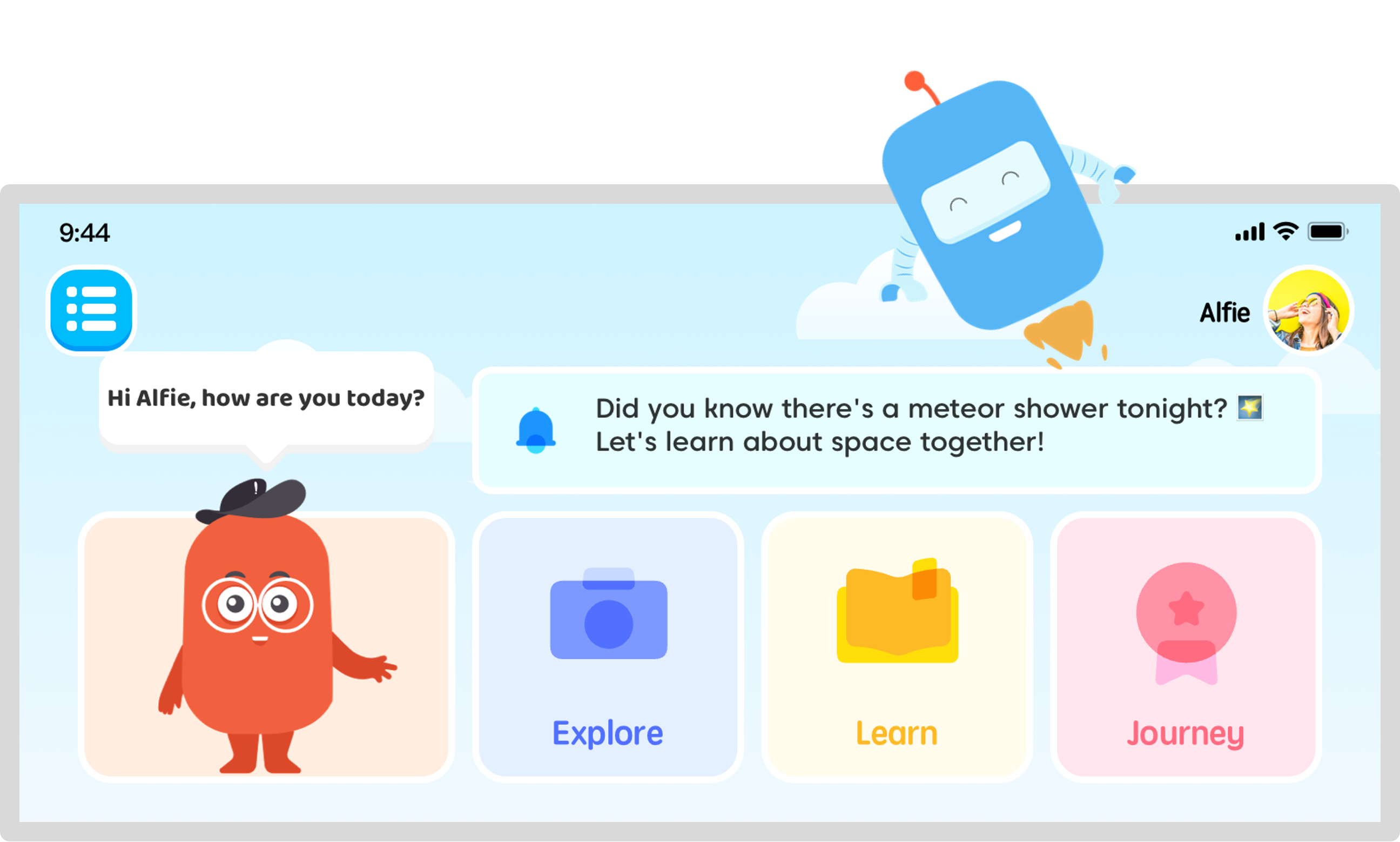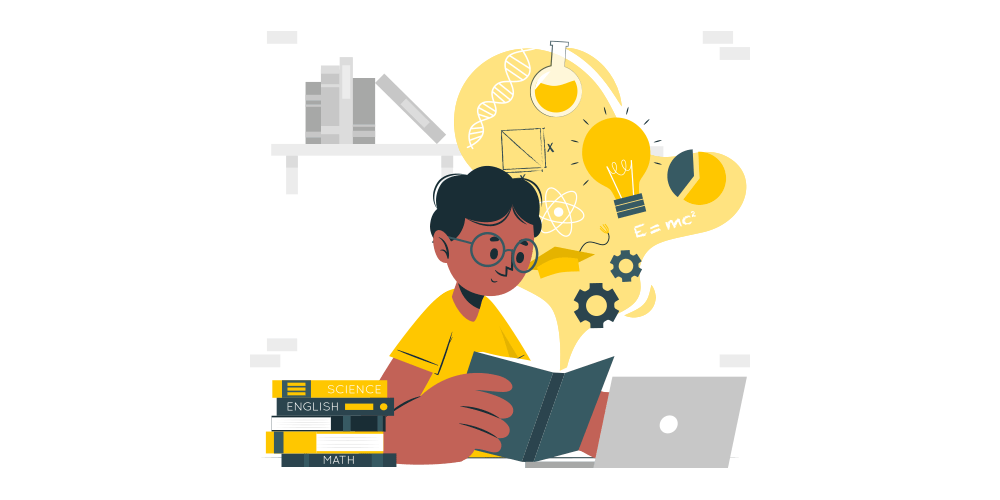Introduction
Artificial Intelligence (AI) has rapidly evolved from a futuristic concept to an integral part of our daily lives. From voice assistants like Siri and Alexa to recommendation systems on streaming platforms, AI technologies have become commonplace. Now, this transformative technology is making its way into early childhood education, offering new possibilities for how young children learn and develop.
The integration of AI in early education raises important questions: How can AI enhance learning experiences for young children? What are the potential benefits and challenges? And perhaps most importantly, how do we ensure that technology complements rather than replaces the essential human connection in early learning?
This article explores these questions and examines how AI-powered tools like WonderBuddy are being designed to support early childhood education while maintaining the crucial balance between technological innovation and human interaction.
Benefits of AI in Early Education
Personalized Learning Experiences
One of the most significant advantages of AI in education is its ability to personalize learning experiences. Every child has unique interests, strengths, and challenges. Traditional educational approaches often struggle to accommodate these individual differences, especially in group settings like classrooms.
AI systems can analyze a child's interactions, identify patterns in their learning style, and adapt content accordingly. This means that as a child engages with an AI-powered educational tool, the experience becomes increasingly tailored to their specific needs and preferences.
"When we personalize learning, we not only meet children where they are, but we also ignite their natural curiosity and love for learning."
— Dr. Maria Montessori
Adapting to Different Learning Paces
Children learn at different rates, and AI can accommodate these varying paces. Unlike a fixed curriculum that moves at a predefined speed, AI systems can adjust the difficulty and complexity of content based on a child's demonstrated mastery.
This dynamic adaptation ensures that children who need more time with certain concepts can proceed at a comfortable pace, while those who grasp ideas quickly can move on to more challenging material, preventing both frustration and boredom.
Immediate Feedback and Reinforcement
AI systems can provide immediate feedback on a child's responses and activities, reinforcing correct answers and gently guiding them through misconceptions. This immediate reinforcement is invaluable in the learning process, helping children understand concepts more deeply and retain information more effectively.
Research in cognitive science has consistently shown that timely feedback is one of the most crucial factors in effective learning, and AI can deliver this feedback in engaging and supportive ways.
Data-Driven Insights for Parents and Educators
AI-powered educational tools can gather valuable data about a child's learning patterns, preferences, strengths, and areas for growth. This information can be invaluable for parents and educators, providing insights that might not be immediately apparent through observation alone.
These insights can inform how adults support a child's learning journey, allowing for more targeted and effective guidance both within and beyond the digital environment.
Challenges and Considerations
Maintaining the Human Connection
While AI offers numerous benefits for early education, it's essential to recognize that technology should complement, not replace, human interaction. Early childhood is a critical period for developing social and emotional skills, which are fundamentally learned through relationships with caregivers, teachers, and peers.
The challenge lies in designing AI tools that enhance human connections rather than diminish them. This means creating experiences that encourage conversation, collaboration, and shared exploration between children and the adults in their lives.
Ensuring Age-Appropriate Content and Interactions
Young children have specific developmental needs and capacities that differ significantly from older learners. AI systems designed for early education must be carefully calibrated to align with these developmental considerations, ensuring that content, interactions, and expectations are appropriate for the age group.
This includes considerations around screen time, cognitive load, language complexity, and the types of activities and challenges presented.
Privacy and Data Security
As AI systems collect data on children's learning and behaviors, questions of privacy and data security become paramount. Parents and educators need to be confident that information gathered about children is protected, used responsibly, and never exploited for commercial purposes beyond the educational goals.
Transparent policies, robust security measures, and clear communication with families are essential components of ethical AI implementation in early education.
Equity and Access
As with any educational technology, there's a risk that AI tools could exacerbate existing inequities if they're not accessible to all children regardless of socioeconomic status, geographic location, or other factors. Ensuring broad access to high-quality AI educational experiences is a critical consideration for developers, policymakers, and educational institutions.
How WonderBuddy Approaches AI for Children
WonderBuddy represents a thoughtful approach to incorporating AI in early childhood education, designed with an understanding of both the potential and the limitations of technology in this context.

Child-Centered Design
At its core, WonderBuddy is built on principles of child-centered design. Rather than attempting to replicate classroom instruction, WonderBuddy creates personalized learning journeys that follow a child's natural curiosity. The AI adapts to each child's interests, learning pace, and preferences, creating a unique path of discovery for each user.
Encouraging Human Interaction
WonderBuddy is designed to spark conversations and joint exploration between children and adults. The platform includes features that prompt discussions, suggest offline activities, and create opportunities for shared learning experiences. In this way, the technology serves as a bridge for human connection rather than a substitute for it.
Research-Backed Approach
Developed in collaboration with educational researchers and early childhood experts, WonderBuddy's approach is grounded in established learning science. The platform incorporates principles from various pedagogical traditions, including inquiry-based learning, constructivism, and sociocultural theories of development.
Transparent and Ethical Data Use
WonderBuddy prioritizes transparency in how data is collected, stored, and utilized. The platform includes robust privacy protections and gives parents control over their child's data. Information gathered is used exclusively to enhance the learning experience and provide insights to parents and educators, never for third-party marketing or unrelated commercial purposes.
The Future of AI in Early Childhood Education
As AI technology continues to evolve, its role in early education will likely expand in several directions:
More Sophisticated Personalization
Future AI systems will likely become even more adept at understanding individual children's learning patterns, emotional states, and developmental needs, creating increasingly tailored experiences that optimize engagement and learning outcomes.
Enhanced Integration with Physical Play
As technologies like augmented reality (AR) become more accessible, we may see greater integration between digital learning experiences and physical play, blurring the boundaries between virtual and tangible exploration.
Expanded Support for Educators
AI tools will increasingly serve as assistants to human educators, providing data-driven insights, suggesting differentiated activities, and handling routine aspects of teaching so that teachers can focus more on relationship-building and complex instructional tasks.
Greater Accessibility and Inclusion
Advances in AI may help make high-quality early education more accessible to all children, including those with disabilities, those in remote locations, and those speaking diverse languages, potentially helping to address persistent inequities in educational opportunity.
Conclusion
AI holds tremendous potential for enhancing early childhood education, offering personalized learning experiences that adapt to each child's unique needs and interests. However, realizing this potential requires a thoughtful approach that recognizes both the capabilities and limitations of technology in the context of young children's development.
The most effective AI tools for early education, like WonderBuddy, will be those that enhance rather than replace human relationships, respect developmental appropriateness, prioritize ethical data practices, and ensure equitable access. When designed with these considerations in mind, AI can serve as a powerful tool for supporting young children's natural curiosity, joy in learning, and holistic development.
As we continue to explore the possibilities of AI in early education, we must maintain a balanced perspective, embracing innovation while always keeping the well-being and developmental needs of children at the center of our efforts. At WonderBuddy, this child-centered philosophy guides everything we do as we work to create AI-powered learning experiences that nurture young minds and inspire a lifelong love of learning.



